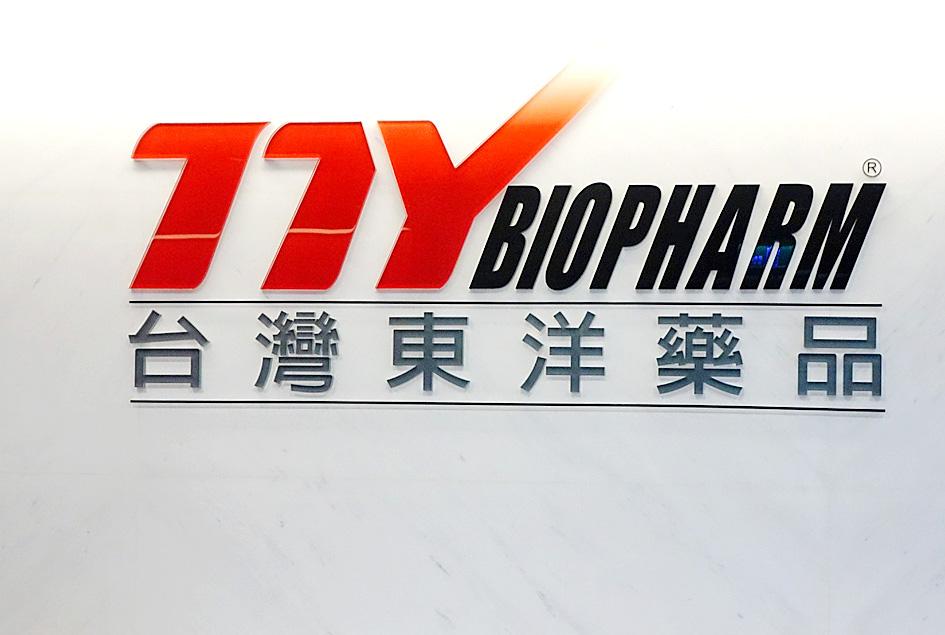The US Food and Drug Administration (FDA) has approved a generic drug developed by Taiwan-based TTY Biopharm Co Ltd (台灣東洋藥品) to treat acute promyelocytic leukemia (APL), the company said on Sunday.
The drug, arsenic trioxide, sold under the brand name Asadin, was first approved for medical use in the US last year, and is listed by the WHO as an essential medicine for treating APL.
APL, a rare form of acute myeloid leukemia (AML), is distinguished by there being too many immature blood-forming cells in the blood and bone marrow, which leads to a shortage of normal white and red blood cells in the body.

Photo: Chang Chia-ming, Taipei Times
It needs to be treated differently from other types of AML, and arsenic trioxide combined with all-trans retinoic acid has become the standard treatment for the cancer.
When APL was first identified in 1957, APL patients had a median survival rate of less than a week, but now 10-year survival rates are plausible thanks to improvements in diagnosis and medication.
TTY Biopharm said in a statement that it hoped the approval of its generic drug could help patients in the US.
The company first received a license to make the drug from the Taiwanese FDA in 2002. It was the first APL treatment license issued in Taiwan.
From 2018, the company developed the drug further under a milestone payment contract with another partner, which it did not identify.
The partner is responsible for the sale, licensing and approval of the TTY Biopharm’s generic drug in international markets, such as Malaysia, the Philippines, Thailand, the US and Vietnam.
The US FDA approval was the first received by TTY Biopharm for any of its drugs, and recognizes the company’s research and development capabilities and manufacturing strength, the company said.
As the materials used to make the drug are highly toxic, the company has partnered with National Central University to create a recycling technique for arsenic ions that makes wastewater from the drug production process safe to release.
In related news, TTY Biopharm’s board of directors yesterday approved the dismissal of general manager Shih Chun-liang (施俊良), after Shih admitted to being involved in an insider-trading scandal involving the company’s shares.
TTY Biopharm chairman Lin Chuan (林全) is also to act as general manager, the company said in a regulatory filing.
Additional reporting by Kao Shih-ching

Shares in Taiwan closed at a new high yesterday, the first trading day of the new year, as contract chipmaker Taiwan Semiconductor Manufacturing Co (TSMC, 台積電) continued to break records amid an artificial intelligence (AI) boom, dealers said. The TAIEX closed up 386.21 points, or 1.33 percent, at 29,349.81, with turnover totaling NT$648.844 billion (US$20.65 billion). “Judging from a stronger Taiwan dollar against the US dollar, I think foreign institutional investors returned from the holidays and brought funds into the local market,” Concord Securities Co (康和證券) analyst Kerry Huang (黃志祺) said. “Foreign investors just rebuilt their positions with TSMC as their top target,

REVENUE PERFORMANCE: Cloud and network products, and electronic components saw strong increases, while smart consumer electronics and computing products fell Hon Hai Precision Industry Co (鴻海精密) yesterday posted 26.51 percent quarterly growth in revenue for last quarter to NT$2.6 trillion (US$82.44 billion), the strongest on record for the period and above expectations, but the company forecast a slight revenue dip this quarter due to seasonal factors. On an annual basis, revenue last quarter grew 22.07 percent, the company said. Analysts on average estimated about NT$2.4 trillion increase. Hon Hai, which assembles servers for Nvidia Corp and iPhones for Apple Inc, is expanding its capacity in the US, adding artificial intelligence (AI) server production in Wisconsin and Texas, where it operates established campuses. This

US President Donald Trump on Friday blocked US photonics firm HieFo Corp’s US$3 million acquisition of assets in New Jersey-based aerospace and defense specialist Emcore Corp, citing national security and China-related concerns. In an order released by the White House, Trump said HieFo was “controlled by a citizen of the People’s Republic of China” and that its 2024 acquisition of Emcore’s businesses led the US president to believe that it might “take action that threatens to impair the national security of the United States.” The order did not name the person or detail Trump’s concerns. “The Transaction is hereby prohibited,”

Garment maker Makalot Industrial Co (聚陽) yesterday reported lower-than-expected fourth-quarter revenue of NT$7.93 billion (US$251.44 million), down 9.48 percent from NT$8.76 billion a year earlier. On a quarterly basis, revenue fell 10.83 percent from NT$8.89 billion, company data showed. The figure was also lower than market expectations of NT$8.05 billion, according to data compiled by Yuanta Securities Investment and Consulting Co (元大投顧), which had projected NT$8.22 billion. Makalot’s revenue this quarter would likely increase by a mid-teens percentage as the industry is entering its high season, Yuanta said. Overall, Makalot’s revenue last year totaled NT$34.43 billion, down 3.08 percent from its record NT$35.52